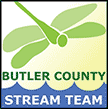
Biological Testing: What We Test & Why
We have recently begun a Biological Sampling program where we study the macroinvertebrates in the water. These include dragonfly nymphs, leeches, water pennys, hellgramites, and more.
Biological testing of the benthic macroinvertebrates (bottom-dwelling organisms including aquatic insects, crayfish, clams, snails, and worms) are often used in studies to determine the quality of waters because of their high numbers, known pollution tolerances, limited mobility, wide range of feeding habits, varied life spans, and dependence on the land environment around the stream. A well-balanced and functioning biological community is one of the best indicators of a healthy stream, capable of providing vital ecosystem services. However, the results of biological surveys are not as accurate as the chemical tests and stream team utilizes both methods to gain a fuller understanding of the health of our water.
Method
Butler County Stream team utilizes the Modified Save Our Streams program developed by the Izaak Walton League and the Virginia Save Our Streams Program. It is an excellent model and provides many resources that are available for us to use.
Training
At least one main training class is held each year, and will be listed on the calendar on our homepage. At other times throughout the summer, additional training opportunities are sometimes available. Please contact Lynn for more details. During this training we will teach you about macroinvertebrate identification and how to use the sampling method that we follow.
Sampling Equipment
Anyone that has attended one of the biological sampling classes can check out one of our three sampling kits. All kits come with kick nets, d-nets, fold-able table, buckets, id sheets, and more.
Identification Resources
A Guide to Common Freshwater Invertebrates of North America
This comprehensive field guide provides extensive background on the biology and ecology of freshwater environments and the invertebrates that thrive in them. Color plates and other identification information are provided for nearly 100 of the most common groups of invertebrates. The book also includes expanded descriptions of the life histories, behavior, and ecology of each invertebrate group. Available through McDonald and Woodward Publishing Company, 800-233-8787,www.mwpubco.com/conservation.htm.
Online
-
Virginia Save Our Streams & Izaak Walton League of America Bug ID Chart
-
Virginia Save Our Streams & Izaak Walton League of America Cheat Sheet
-
Simple one-page key from the Izaak Walton League of America’s Creek Freaks program.
-
West Virginia Save Our Streams keys and educational resources for macroinvertebrate identification
-
Carnegie Museum of Natural History Aquatic Macroinvertebrate Collection.
Stream Programs for Families
Each summer, Butler Soil and Water Conservation District in partnership with MetroParks of Butler County offer free creek programs for families. These programs are usually on Thursdays at 10 am. A complete list of these programs can be found on Butler Soil and Water's calendar www.butlerswcd.org/calendar



